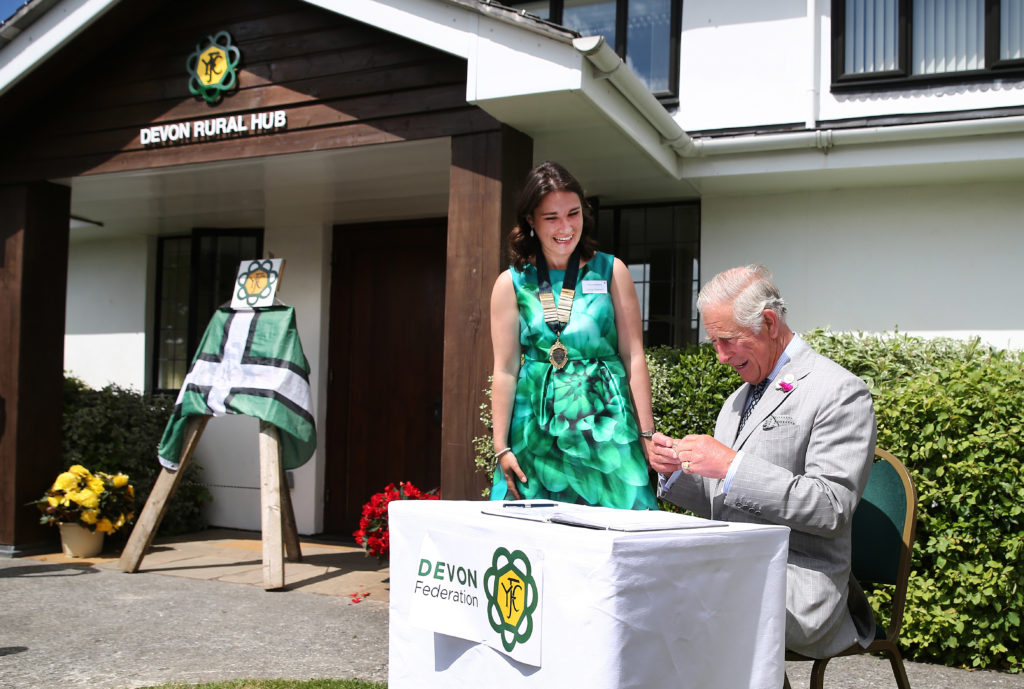
Claire Bellew is nearing the end of her tenure as Chair of Devon Young Farmers, a year which has seen milestones achieved, Royal visits and major campaigns for the group. Devon Young
Farmers has 38 clubs and 1,600 members across Devon.
Rural Newslink caught up with Claire to talk about her year at the helm and the key issues facing young farmers today.
What is your biggest success in your year as Chair of Devon Young Farmers?
A big milestone for us was moving into our own building, The Rural Hub in the Amory Building in Cheriton Bishop. This is the culmination of years of hard work and fundraising by many, many people. We bought the building in 2014 and have renovated it too. It gives us
security for the future, as we own this building outright, while we always had a lease before.
It has also been a really successful year for the county with great results in many national competitions.
What have you enjoyed most about the year?
In July HRH The Prince of Wales came to officially open the Amory Building. It was a fantastic day with members and supporters showing what we are all about, with loads of demonstrations from sheep shearing, street dancing and flower arranging to farm safety.
What will your legacy be?
One of the things I started this year was ‘cross-fertilisation’ between clubs. This brings two clubs together from different parts of the county so that they can socialise, share ideas and meet new people. We are also bringing back the Agricultural Business Programme which will run over evenings throughout the Autumn and Winter. This will be a chance for young farmers to meet industry leaders and professionals to allow them to move forward within their farming career.
We used to run these seven or eight years ago, and I felt it would be a good thing to bring back.
I very much hope that both of these continue after I finish my role as Chair.
What are the biggest challenges facing young farmers today?
The two main issues are access to land and capital to start their farming careers. Even if you are from a farming family and may have access to land that way, young farmers can really struggle to raise the finance they need to invest and make improvements on their farms.
What do we need from government to ensure young farmers have a secure future in the industry?
Support and funding are crucial. We are all in the dark about what is happening with the Basic Payment Scheme after Brexit, so some clarity over that is important. Without the right support and funding it is very hard for a young farmer to compete with an established farmer.
How can the rest of the farming community help young farmers?
By sharing their expertise and experience and opening up land opportunities to young farmers.
Stephens Scown has been working with Devon Young Farmers on land partnerships and we will be running workshops together in the future.
Why are land partnerships so important to young farmers?
It goes back to the need for access to land. This can be the biggest hurdle for many young farmers. Land partnerships are working well in other countries, particularly New Zealand, and are a great way to match young people entering the industry with established farmers who may want to take a step back. There are benefits on both sides.
Are there any particular models of land partnerships that are of most interest to young farmers?
It really depends on the individuals involved. The great thing is that there is a lot of flexibility, so as long as the young farmer and landowner talk and discuss what they both want to achieve, it is likely that they will find a way of working together that benefits them both.
In your view, why is farming a great career for a young person?
Farming gives young people a chance to have a career that allows them to manage the environment and landscape and produce the food that our country needs.
There is also an increasing need for farmers to have a clear business focus, which gives another exciting aspect to the career.
The digital marketing expert from Stephens Scown’s marketing team met with Devon Young Farmers to discuss social media recently. Is this an increasing area of importance for Devon Young Farmers as an organisation and for young farmers generally?
Yes, for us as a group, social media has proved to be a great way to share information. We will never replace meetings and activities, because getting together face to face is so important, but social media gives us an extra way to connect.
For farmers generally it is a brilliant way to show people what you do. Many people who buy food produced on farms will never have visited a farm themselves, but will want to know more about where their food has come from. Social media is a brilliant way to do that and show
how important farming is.
Stephens Scown is supporting your latest campaign. What is the campaign, and what do you hope it will achieve?
We launched our safety campaign ‘Growing Safer Farmers’ at this year’s Devon County Show, with the support from the Countess of Wessex. We very tragically lost two of our members this year in farm accidents, so we know things need to change in the industry.
One aspect is working closely with machinery dealers across Devon to encourage farmers to cover PTO shafts on their machinery. When machinery goes in to be fixed, farmers will be asked if they want the PTO shaft to be covered, and if they don’t they will need to sign a
declaration saying that they declined. It is not a big deal to do it, but it really will save lives.
The tragic death of another of our members, Todd Riggs, in July in a tractor accident has led to an on-line campaign #BuckleUpForIceMan, to encourage farmers to fasten their seatbelts. The campaign was started by some of his friends and we are working together to spread the message.
Farmers work hard work for long hours, and that makes accidents more likely to happen. Safety is there at the back of farmer’s minds, but we need to bring it to front of mind. As young farmers we have the opportunity to change things and start a new focus on safety in the industry.
You have a full time job as a rural surveyor for Kivells, as well as being Chair of Devon Young Farmers. How have you managed to juggle the two and has your role with Devon Young Farmer’s helped your career?
It has been hard work, but I’ve really loved every minute. I’m very fortunate that Kivells has been so supportive of my role as Chair and I would like to thank them for that.
I’ve found that both roles have complemented each other. work at Exeter Livestock Centre, so on market days there is a great chance to meet young farmers and chat to them about the support they may need from the county. On the other side I carry out a lot of professional work for young farmers and their families. It is important that Devon Young Farmers stays relevant and keeps providing the support, opportunities and activities that young farmers need.
What are your aspirations for Devon Young Farmers over the next few years?
We have a great system, where you start at Junior Vice Chair, then Vice Chair before taking over as Chair. That means we have a lot of continuity when a Chair moves on.
I’ve enjoyed working with Colin Tucker as Vice Chair and I know he will carry on with many of the great initiatives we have worked on together when he takes over from me. I hope the ‘Growing Safer Farmers’ campaign will continue to grow and gain publicity.
Now we are in our new building, I am sure we will continue working with lots of rural businesses and offering our meeting rooms for others to rent. I’m sure the work we have
done to develop the programme and activities we offer will continue. In particular the more business and agricultural focused events, which are proving to be really popular.
For more information about Devon Young Farmers visit www.devonyfc.co.uk
This article was first published in our rural newsletter Newslink.
Click here to join the mailing list

